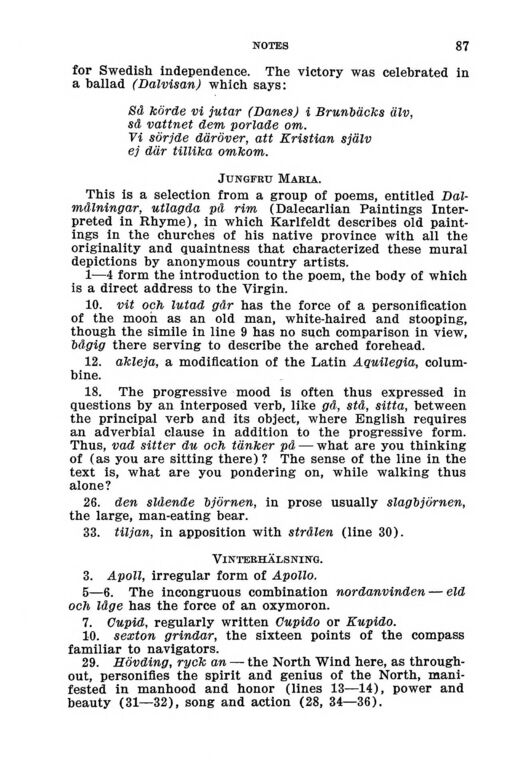
Full resolution (JPEG) - On this page / på denna sida - Sidor ...

<< prev. page << föreg. sida << >> nästa sida >> next page >>
Below is the raw OCR text
from the above scanned image.
Do you see an error? Proofread the page now!
Här nedan syns maskintolkade texten från faksimilbilden ovan.
Ser du något fel? Korrekturläs sidan nu!
This page has never been proofread. / Denna sida har aldrig korrekturlästs.
NOTES 87
for Swedish independence. The victory was celebrated in
a ballad (Dalvisan) which says:
Så körde vi jutar (Danes) i Brunbäcks älv,
så vattnet dem porlade om.
Vi sörjde däröver, att Kristian själv
ej där tillika omkom.
JUNGFRU MARIA.
This is a selection from a group of poems, entitled
Dalmålningar, utlagda på rim (Dalecarlian Paintings
Interpreted in Rhyme), in which Karlfeldt describes old
paintings in the churches of his native province with all the
originality and quaintness that characterized these mural
depictions by anonymous country artists.
1—4 form the introduction to the poem, the body of which
is a direct address to the Virgin.
10. vit och lutad går has the force of a personification
of the moon as an old man, white-haired and stooping,
though the simile in line 9 has no such comparison in view,
bågig there serving to describe the arched forehead.
12. akleja, a modification of the Latin Aquilegia, colum-
bine. -
18. The progressive mood is often thus expressed in
questions by an interposed verb, like gå, stå, sitta, between
the principal verb and its object, where English requires
an adverbial clause in addition to the progressive form.
Thus, vad sitter du och tänker på — what are you thinking
of (as you are sitting there)? The sense of the line in the
text is, what are you pondering on, while walking thus
alone?
26. den slående björnen, in prose usually slagbjörnen,
the large, man-eating bear.
33. tiljan, in apposition with strålen (line 30).
VINTERHÄLSNING.
3. Avpoll, irregular form of Apollo.
5—6. The incongruous combination nordanvinden — eld
och låge has the force of an oxymoron.
7. OCupid, regularly written Cupido or Kupido.
10. sexton grindar, the sixteen points of the compass
familiar to navigators.
29. Hövding, ryck an — the North Wind here, as
throughout, personifies the spirit and genius of the North,
manifested in manhood and honor (lines 13—14), power and
beauty (31—32), song and action (28, 34—36).
<< prev. page << föreg. sida << >> nästa sida >> next page >>